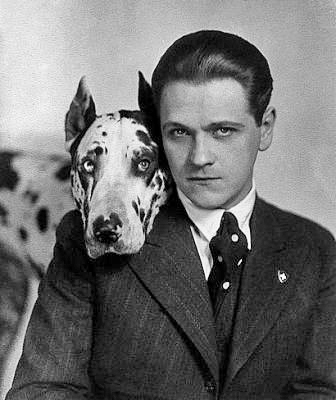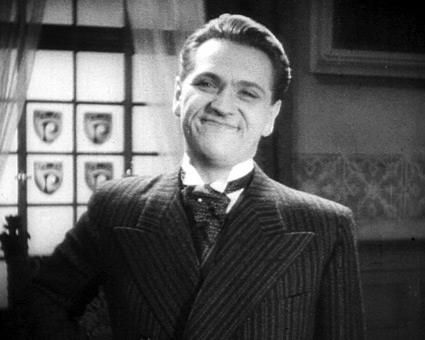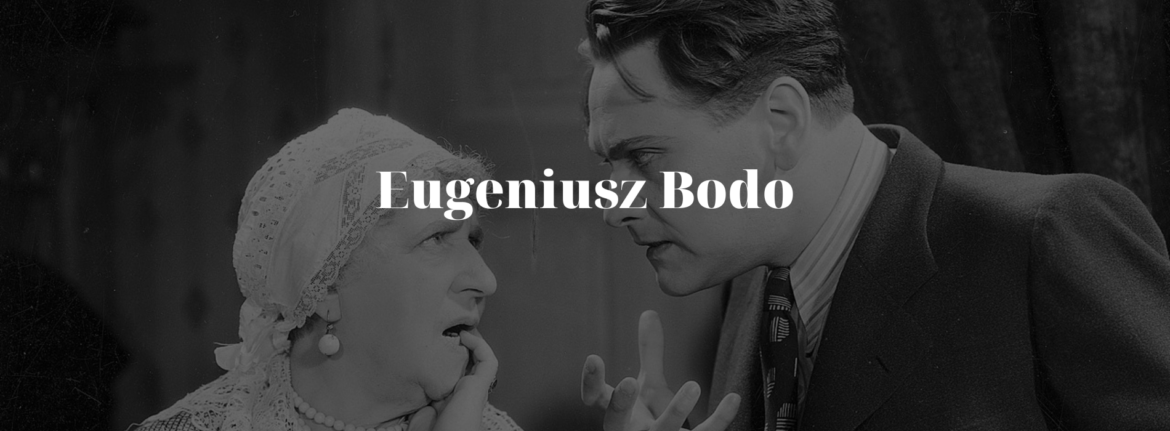Eugeniusz Bodo, born Bohdan Eugène Junod on 28 December 1899 in Geneva, was one of the most significant figures in Polish entertainment during the interwar period. His versatile talents encompassed film and theatre acting, directing, screenwriting, singing, and dancing. His charisma and artistic abilities made him an icon of Polish popular culture of the time.
Early Life and Career Beginnings
Bodo was born to Teodor Junod, a Swiss engineer of French descent, and Anna Dorota Dylewska, a Polish noblewoman from Mazovia. In 1903, his family moved to Łódź, where his father, fascinated by silent cinema, partnered with film promoter Edward Juliusz Vortheil to establish a film company and create the Theatre of Illusions „Urania.” His mother ran a restaurant called „Masque.” It was in this setting that young Bodo made his stage debut at just ten years old, likely performing under the title „10-year-old Cowboy Bodo – The Wonder Child of the 20th Century,” singing „Yankee Doodle.” His stage name „Bodo” was a fusion of the first syllables of his first name, „Bohdan,” and his mother’s third name, „Dorota.”
At 18, in 1917, he ran away from home and found work as a ticket seller at the Apollo Theatre, where he soon began appearing as an extra in performances. His career progressed through theatres in Łódź and Lublin, and by 1920, he relocated to Warsaw. Initially, his performances in the capital’s cabarets did not bring the anticipated success. His breakthrough came with his appearance in the cabaret „Qui Pro Quo,” where he debuted in „Amerykanka.” He later performed in productions such as „Serce i bufet,” „Black and White,” and „Precz z nagością.” While some critics found his acting skills and voice average, he enjoyed immense popularity, particularly among women. In 1925, he left „Qui Pro Quo” to join the „Perskie Oko” Theatre.
Film and Music Career
Bodo’s film debut took place in 1925 in the silent movie „Rywale,” where he developed his signature on-screen appearance, which included heavy eye makeup. With the advent of sound films, his fame soared. He appeared in over 30 films, often in leading roles. Some of his most notable works include „Jego ekscelencja subiekt” (1933), „Czy Lucyna to dziewczyna?” (1934), „Pieśniarz Warszawy” (1934), and „Piętro wyżej” (1937). The latter film became particularly famous for his performance of the song „Sex Appeal,” during which he appeared dressed as Mae West—a bold move for the era.
Bodo was also a talented singer. His renditions of songs such as „Umówiłem się z nią na dziewiątą,” „Ach, śpij kochanie,” and „Już taki jestem zimny drań” became hits and remain associated with him to this day. His charismatic stage and film presence made him one of the most beloved artists of the period.
Legal Troubles
On 26 May 1929, at 2:15 AM, Bodo was involved in a fatal car accident while traveling from Warsaw to Poznań with a group from the „Morskie Oko” cabaret. Near Łowicz, the car he was driving veered off the road and tumbled down a four-meter embankment. Actor Witold Ronald died on the spot. Bodo had been driving at approximately 40 km/h, which, given the poor road conditions of the time, was considered excessive speed. In 1932, he was sentenced to six months in prison, suspended.
Production and Business Ventures
Beyond acting, Bodo was also involved in film production. In 1932, he co-founded the B.W.B. film studio (named after its founders: Bodo, Waszyński, and Brodzisz), which produced several films. When the company ceased operations in 1933, he established his own studio, „Urania-Film,” a nod to his father’s former cinema. Additionally, he co-owned „Café Bodo” on Foksal Street in Warsaw, which became a popular meeting place for artists and culture enthusiasts.


Personal Life
Bodo was renowned for his elegant style and became a fashion icon. His private life was often the subject of speculation and gossip. One of his most talked-about relationships was with Tahitian dancer Reri, for whom he wrote the screenplay of the 1934 film „Czarna perła.” However, their relationship did not last.
World War II and Tragic Death
With the outbreak of World War II, Bodo initially fled to Białystok and later, after the Soviet occupation, moved to Lwów, where he continued performing in theatres and cabarets. In 1941, following the German invasion of the Soviet Union, he was arrested by the NKVD on charges of espionage, likely due to his Swiss passport. He was transported to Moscow, and after being sentenced to five years of hard labor, he was deported to a gulag in Kotlas. The Polish embassy attempted to secure his release, but their efforts only reinforced Soviet suspicions of his alleged guilt. Shortly after arriving in Kotlas, he was diagnosed with pellagra, a disease caused by severe malnutrition. Weakened and suffering from illness, Bodo died on 7 October 1943. He was buried in a mass grave.
For many years, the circumstances of his death remained a mystery. During the Communist era in Poland, the official narrative falsely claimed that he had been executed by the Germans in Lwów in 1943. The truth about his tragic fate was not revealed until 1991.
Legacy
Eugeniusz Bodo remains a symbol of the golden age of Polish cinema and cabaret. His contributions to Polish popular culture are immeasurable, and his songs and films continue to captivate audiences, ensuring his enduring place in the history of Polish entertainment.
